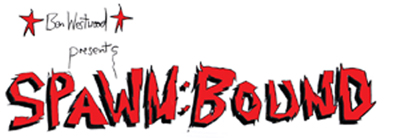‘CELEBRITY SPAWN’ JADE JAGGER STELLA MCARTNEY,
PIXIE & PEACHES GELDOF FOCUS OF
BEN WESTWOOD EXHIBITION

Son of Dame Vivienne Westwood, Ben Westwood’s latest exhibition ‘Spawn:Bound’ at the Bodhi Gallery, Brick Lane from Thursday 28th May – Wednesday 10th June 2009 investigates the modern phenomenon of ‘famous children of the famous’, bound forever by the umbilical cord of their parents fame.
Westwood, who is spawn himself, examines Lily Allen, Pixie and Peaches Geldof, Leah Wood, Kimberly Stewart, Theodora Richards, Amber Le Bon, Stella McCartney, Jade and Elizabeth Jagger, to name but a few, who all have fame derived and entangled up and ultimately held back by, the celebrity status bestowed upon them from their famous parents.
AN EXPLANATION ABOUT BEN WESTWOOD
The pressures and celebrity status thrust upon the children of pre-internet celebrities is a new phenomenon. The children of ‘nostalgia’ celebrities have replaced the children of aristocracy in terms of their status and perceived cultural importance, according to fashion photographer and pornographer Ben Westwood. It’s not ‘Lady this...’ and ‘Lord that...’, but instead rock children, film children, TV children. Rockstocracy! Infact there’s been a major outbreak of celebrity spawn. We’re talking about the children of major stars like Sir Paul McCartney, Sir Mick Jagger, Phil Collins, Ronnie Wood, Keith Richards, Simon Le Bon and Rod Stewart, celebrities who commanded a mass audience through non-internet straight and limited media distribution in the 60s, 70s and 80s, where life was simpler and not deluged by social networking sites, weblogs, the digital television universe and hundreds of celebrity magazines. Too Much! Stars who made a massive impact on everyone, and who are still beacons, the only real stars. They are the new establishment. Their off-spring are the reproduction of that original fame, fame that still acts as a flagpost in the hill, but which has reated a generation of children bound by their parent’s fame. Impossible to be free of. Forever entangled. Spawn: Bound.
Ben Westwood was born while Vivienne was a teacher, married to her first husband, Derek, a pilot. When his parents split up, Ben and his mother came to London, where Vivienne met Malcolm McLaren and the pair created their place at the centre of the punk explosion. It was all very exciting, bricks were thrown through their windows, there were few rules at home, the Sex Pistols were often round for tea. Johnny Rotten once took the young Ben to the dentist. Ben and his younger brother, Joe Corre, who now owns Agent Provocateur, were allowed to go on a cycling holiday to Devon on their own, aged 10 and six, pitching their tent along the way. “It was really good. I had been reading the Famous Five and I wanted to go off and have lashings of ginger beer and an adventure,” says Ben Westwood. How did he get on with McLaren? “I had a bit of a wary relationship with him,” says Westwood. “He was a bit of a wild character around the house. He was about 19 when I met him - his girlfriend had me, a three-year-old kid, so he wasn’t quite father material in a way. But he’s a very interesting person and I learned a lot from him.” He thinks for a while. “There’s that sort of bravery, the same as my mum. They are adventurous and they both opened my eyes to a lot of things. I always knew my mother was a good person and I believed in her morals and judgment. She’s a free-thinker. She’s not worried about whether or not she does something different from the establishment. So that’s come through to me - you stand up for what you believe in.” Did he ever wish he had safe, boring parents? “Sometimes, because some people have a view of me that’s a bit blinkered because they start seeing me as the son of my mother. I suppose I wanted to rebel against other people’s view.” One of the expectations he comes across, he says, is that “I should have money, which I don’t. To have people say, ‘You’re lucky, you’re all right ... ‘” His mother and stepfather’s achievements and cultural influence must have been a lot to live up to, perhaps more of a burden than he is prepared to say. He stands looking out of the window at the darkening sky. “That’s something. Do I have to equal what they’ve done?” he says to himself. “No, I don’t, really. I just have to be myself.” Did he struggle with that? “I did a little bit, but ... I don’t know. I’ve got over that.”